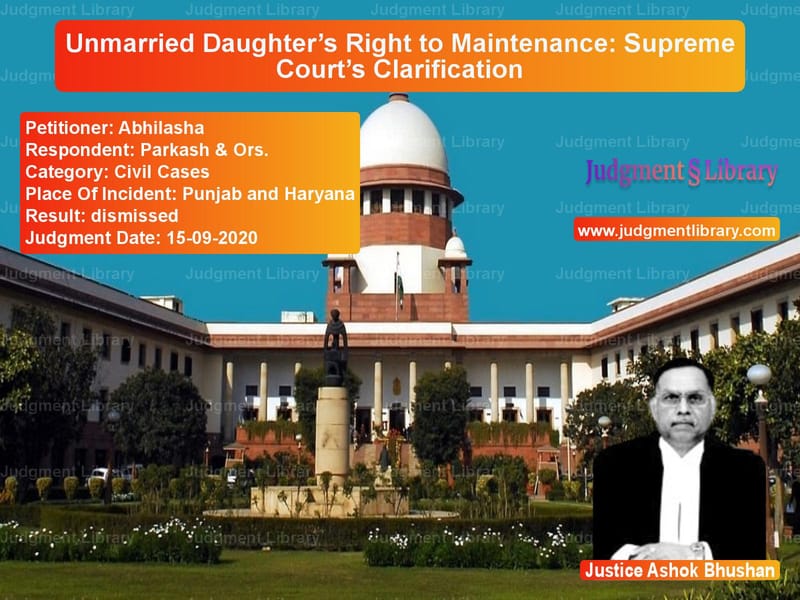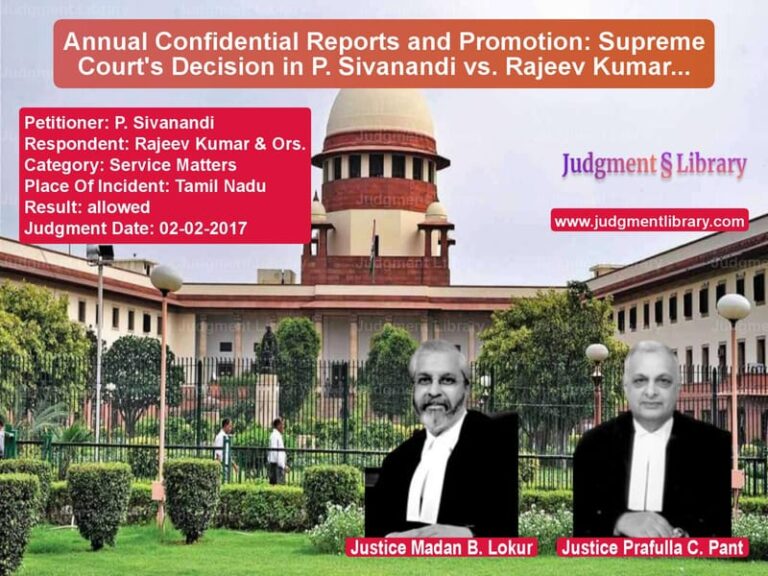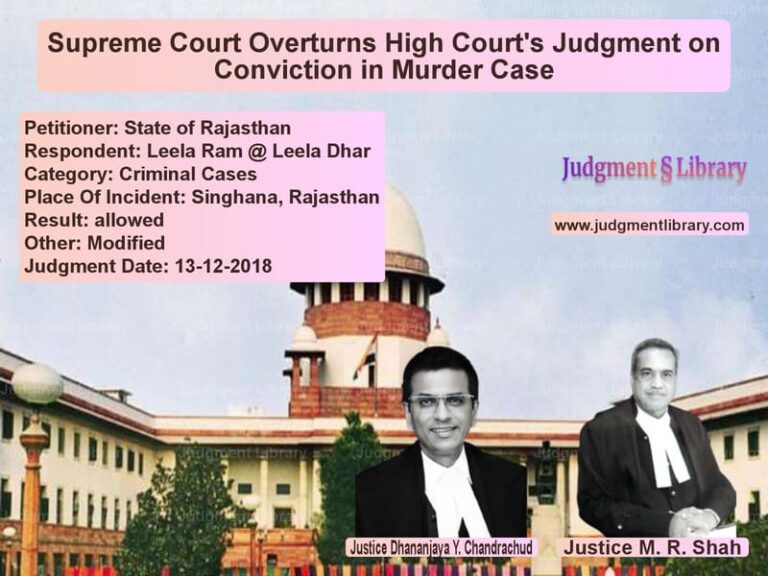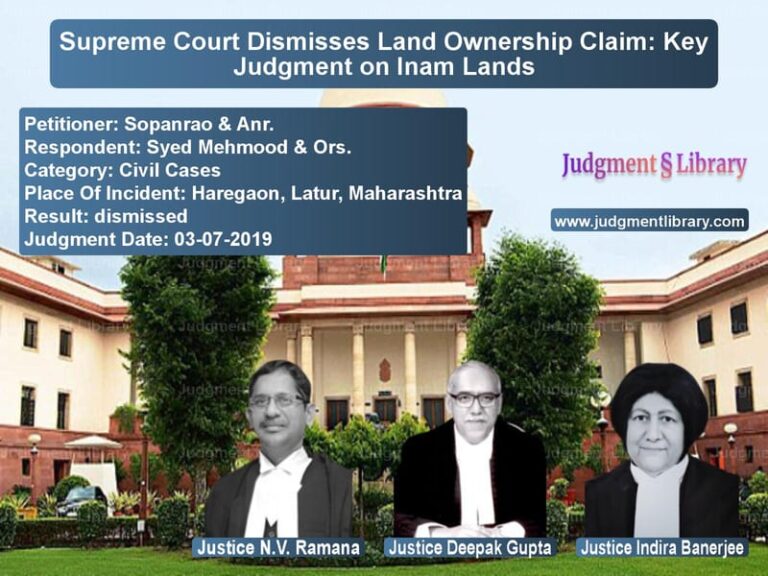Unmarried Daughter’s Right to Maintenance: Supreme Court’s Clarification
The case of Abhilasha vs. Parkash & Ors. addresses a crucial legal question: whether an unmarried daughter is entitled to claim maintenance from her father beyond attaining majority under Section 125 of the Code of Criminal Procedure (CrPC). The Supreme Court had to determine whether the provisions of the Hindu Adoptions and Maintenance Act, 1956, could be invoked in a CrPC proceeding to extend maintenance rights beyond majority.
The appellant, Abhilasha, challenged the Punjab and Haryana High Court’s decision, which upheld the lower court’s ruling that maintenance under Section 125 CrPC was only available to a minor child and could not be extended after the child attains majority unless the child suffers from a physical or mental abnormality. The Supreme Court, while dismissing the appeal, clarified that while an unmarried Hindu daughter is entitled to claim maintenance from her father under Section 20 of the Hindu Adoptions and Maintenance Act, such a claim must be pursued under the appropriate civil law and not under Section 125 CrPC.
Background of the Case
The appellant, Abhilasha, was the daughter of respondent No.1, Parkash. The case arose from a maintenance claim filed by the appellant’s mother on behalf of herself and her three children under Section 125 CrPC. The facts are as follows:
- The application for maintenance was filed on October 17, 2002, when Abhilasha was still a minor.
- On February 16, 2011, the Judicial Magistrate First Class, Rewari, dismissed the maintenance claims of the mother and two sons but allowed maintenance for the appellant only until she attained majority.
- On February 17, 2014, the Additional Sessions Judge, Rewari, upheld the Magistrate’s decision and ruled that as per Section 125 CrPC, an unmarried daughter is entitled to maintenance only if she suffers from a physical or mental abnormality.
- The appellant filed an application under Section 482 CrPC before the High Court, which was dismissed on August 16, 2018.
- Aggrieved by this decision, she approached the Supreme Court.
Petitioner’s Arguments
The appellant, represented by Senior Advocate Vibha Datta Makhija, contended:
- Although she had attained majority, she remained unmarried and was entitled to claim maintenance from her father.
- The High Court erred in dismissing her claim on the premise that only a child suffering from physical or mental abnormalities could claim maintenance after attaining majority.
- Section 20 of the Hindu Adoptions and Maintenance Act, 1956, extends the obligation of a father to maintain his unmarried daughter until she is married.
- The Supreme Court, in Jagdish Jugtawat vs. Manju Lata (2002) 5 SCC 422, had allowed maintenance beyond majority under similar circumstances.
- She was unemployed and financially dependent, justifying her entitlement to maintenance.
Respondent’s Arguments
The respondents countered:
- Section 125 CrPC explicitly states that maintenance for a child ceases when the child attains majority unless the child suffers from a disability.
- The Additional Sessions Judge had correctly found that the appellant did not suffer from any physical or mental abnormality, making her ineligible for continued maintenance under CrPC.
- The appellant’s reliance on the Hindu Adoptions and Maintenance Act, 1956, was misplaced in a CrPC proceeding.
- The High Court’s decision was correct in declining to interfere under Section 482 CrPC.
Supreme Court’s Key Observations
The Supreme Court analyzed the statutory framework of maintenance under both CrPC and the Hindu Adoptions and Maintenance Act, 1956. The Court made the following key observations:
“The scheme of Section 125 CrPC does not recognize an unmarried daughter’s right to claim maintenance after attaining majority, unless she suffers from any physical or mental abnormality. A father’s obligation under Section 20 of the Hindu Adoptions and Maintenance Act, 1956, is a separate right that must be enforced through civil proceedings.”
The Court further noted:
- Section 125 CrPC provides immediate relief to neglected wives, children, and parents through summary proceedings, whereas the Hindu Adoptions and Maintenance Act deals with a broader right under personal law.
- Section 20(3) of the Hindu Adoptions and Maintenance Act, 1956, recognizes a father’s obligation to maintain his unmarried daughter beyond majority.
- The decision in Jagdish Jugtawat does not override the clear provisions of Section 125 CrPC but merely upheld a High Court order refusing to interfere with a Family Court’s decision.
- The proper remedy for an unmarried daughter seeking maintenance beyond majority lies under Section 20 of the Hindu Adoptions and Maintenance Act, not under Section 125 CrPC.
Legal Precedents Considered
The Supreme Court relied on several important precedents:
- Dinanath vs. Usha (2014) 2 SCC 706: Held that maintenance under Section 125 CrPC ceases after a child attains majority unless the child has a disability.
- Jagdish Jugtawat vs. Manju Lata (2002) 5 SCC 422: Observed that maintenance could be extended under personal law but did not alter the application of CrPC.
- Nanank Chand vs. Chandra Kishore Aggarwal (1969) 3 SCC 802: Clarified that Section 125 CrPC provides a summary remedy applicable to all persons regardless of personal law.
Final Judgment
The Supreme Court dismissed the appeal, holding:
“The appellant’s claim for maintenance under Section 125 CrPC was rightly rejected. If she seeks maintenance as an unmarried daughter under Section 20 of the Hindu Adoptions and Maintenance Act, she must approach the appropriate civil court.”
The Court granted the appellant liberty to pursue a civil claim for maintenance but refused to extend relief under CrPC.
Implications of the Judgment
This ruling has significant implications for maintenance law:
- It reaffirms that maintenance claims under Section 125 CrPC are limited to minor children, except in cases of physical or mental disability.
- It clarifies that an unmarried daughter must seek maintenance under Section 20 of the Hindu Adoptions and Maintenance Act, 1956.
- It ensures that personal law remedies remain separate from statutory provisions under CrPC.
- It aligns judicial interpretation with legislative intent, preventing the misuse of summary proceedings under Section 125 CrPC.
With this judgment, the Supreme Court has provided clarity on maintenance rights for unmarried daughters, reinforcing the distinction between statutory provisions and personal law remedies.
Petitioner Name: Abhilasha.Respondent Name: Parkash & Ors..Judgment By: Justice Ashok Bhushan.Place Of Incident: Punjab and Haryana.Judgment Date: 15-09-2020.
Don’t miss out on the full details! Download the complete judgment in PDF format below and gain valuable insights instantly!
Download Judgment: Abhilasha vs Parkash & Ors. Supreme Court of India Judgment Dated 15-09-2020.pdf
Direct Downlaod Judgment: Direct downlaod this Judgment
See all petitions in Damages and Compensation
See all petitions in Succession and Wills
See all petitions in Legal Malpractice
See all petitions in Judgment by Ashok Bhushan
See all petitions in dismissed
See all petitions in supreme court of India judgments September 2020
See all petitions in 2020 judgments
See all posts in Civil Cases Category
See all allowed petitions in Civil Cases Category
See all Dismissed petitions in Civil Cases Category
See all partially allowed petitions in Civil Cases Category







